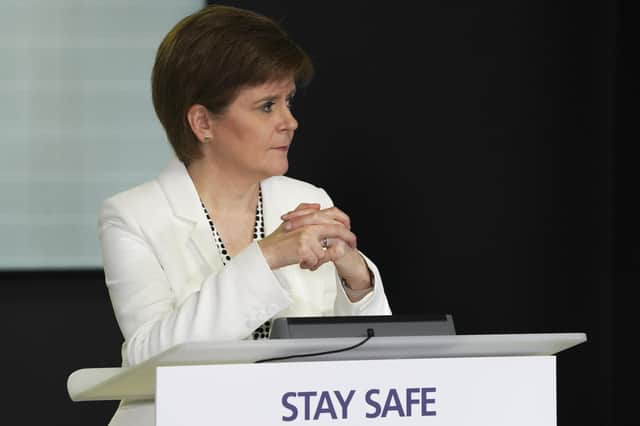Higher LBTT threshold a mere ‘token gesture’ - David Alexander comment


She tends to distance herself from pronouncements on relaxing restrictions in England already made by the Prime Minister but then follows suit several days (or perhaps a week) later, with the Holyrood rules tweaked somewhat – “to follow the science”, of course.
And so it was when the Chancellor of the Exchequer, Rishi Sunak, announced a temporary stop on payments of stamp duty on residential property transactions to the value of £500,000 in England and Wales. At first the hints coming from Holyrood were that Scotland need not follow the same direction because with a threshold of £145,000, a majority of transactions north of the Border were not subject to Land and Buildings Transaction Tax (LBTT – our equivalent of stamp duty).
Advertisement
Hide AdAdvertisement
Hide AdNot long afterwards, the Scottish business secretary Kate Forbes said her government would, after all, be raising the threshold here, albeit limited to £250,000. So what are we to make of this? Is the SNP playing politics or is this a realistic assessment that the property market in Scotland is, in a very practical sense, different from England and the £250,000 threshold is a balanced response to current needs? To be frank, the answer is “No, I’m afraid not”.
For a start, it took Ms Forbes almost a week to follow the Chancellor in setting a start date for the concession to begin (yesterday) which led to potential buyers and sellers – with the exception of those making essential moves – holding back on decisions, slowing down what market activity there was. Thankfully, the period of the concession will last as long in Scotland as it will in England – to 31 March next year.
As for setting the threshold at £250,000, the Scottish Government says this will mean around 80 per cent of all residential sales in Scotland (except those involving additional dwellings) will not be subject to LBTT. Maybe so, but the revised rule will not cover 80 per cent of the value of sales in Scotland because – just like England – our market is something of a patchwork quilt.
The new threshold might help the market in Airdrie or Greenock, which of course is to be welcomed, but will have much less of an effect on buyer activity in Edinburgh and East Lothian or on those affluent suburbs on the edge of Glasgow, such as Bearsden or Newton Mearns. The (untouched) higher rates of LBTT will have the same dampening effect on sales in these locations as they have done since they were introduced five years ago.
Suggested alternative
By extending the threshold to £500,000 and thus boosting the middle to upper echelons of the market, the Scottish Government would have at least earned half a loaf in income – which to me is better than no loaf at all. To put the situation into perspective, buyers of property worth £500,000 in England will avoid stamp duty altogether while their Scottish equivalents will pay £20,750.
In a sale worth £750,000, the stamp duty in England will be £12,500 compared to a tax of £46,200 in Scotland. Given the SNP’s wider social and economic policies, I don’t expect its ministers to have much sympathy for people able to spend £750,000, but the effect of continuing with a draconian tax on higher-priced properties is to create a logjam in the middle of the market, which diminishes the chance for aspiring buyers to “trade up” (something which should increase the tax take as a result of more sales).
Even more importantly, the temporary “holiday” on LBTT is not just about helping homebuyers, it is also about saving the myriad jobs that feed off each and every property transaction. If Ms Forbes (or her advisers) could not bring herself to follow Rishi Sunak, then reducing the current rates on LBTT on sales above £325,000 (the point after which the tax becomes more expensive in Scotland than in England) would at least have helped. Instead what we have is a token gesture – and yet another lost opportunity.
David Alexander is MD of DJ Alexander.
A message from the Editor:
Thank you for reading this story on our website. While I have your attention, I also have an important request to make of you.
Advertisement
Hide AdAdvertisement
Hide AdThe dramatic events of 2020 are having a major impact on many of our advertisers - and consequently the revenue we receive. We are now more reliant than ever on you taking out a digital subscription to support our journalism.
Subscribe to scotsman.com and enjoy unlimited access to Scottish news and information online and on our app. Visit https://www.scotsman.com/subscriptions now to sign up. By supporting us, we are able to support you in providing trusted, fact-checked content for this website.
Joy Yates
Editorial Director
Comments
Want to join the conversation? Please or to comment on this article.